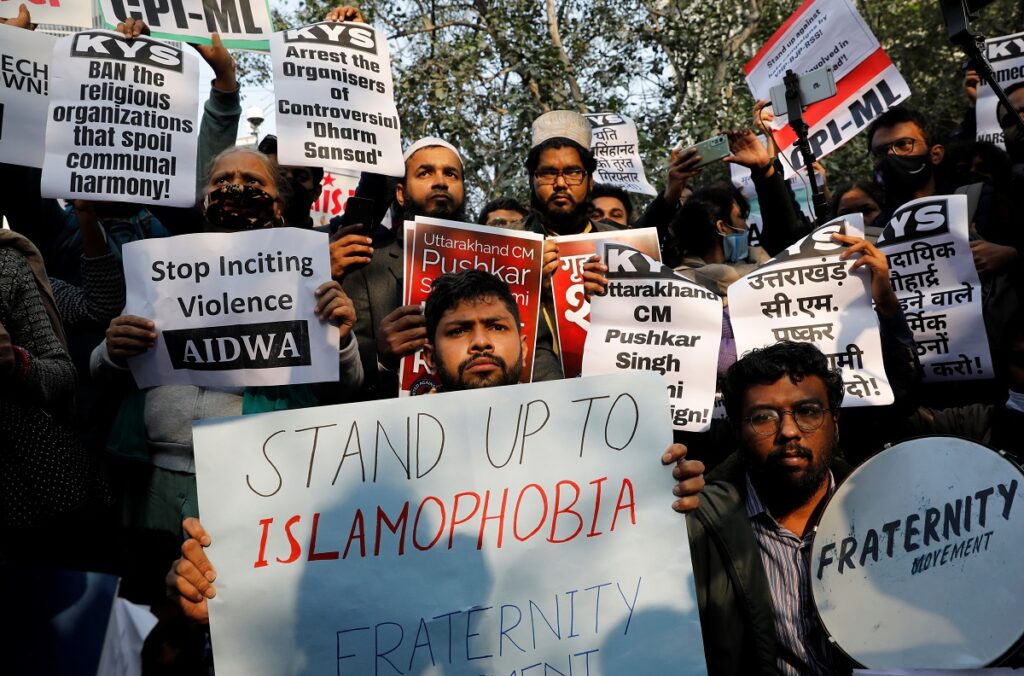- Web
- Yesterday
US report on religious freedom shows minorities’ treatment in India
-

- Web Desk
- Jun 27, 2024

WASHINGTON: The United States (US) Department of State released its “2023 Report on International Religious Freedom” on Wednesday, with its report on India highlighting escalating attacks and tensions involving religious minorities, especially Christians and Muslims, within its majority Hindu population.
According to the US State Department’s website, the report examined legislative reforms debates and incidents of communal violence within India’s diverse religious communities. The report also assessed India’s constitutional protections alongside ongoing challenges in safeguarding its religious minorities.
Read more: India condemns US religious freedom report as blatant “propaganda”
As per the State Department, the report provides a “detailed assessment” of global religious freedom dynamics. It draws from a wide array of sources including US embassies, governmental bodies, religious organisations, NGOs, journalists, and academics. The report claims to offer an “impartial overview” of governmental policies and societal practices impacting religious beliefs worldwide.
In 2023, India’s executive summary highlighted constitutional protections safeguarding religious freedom, encompassing the rights to practice, propagate, and profess religion. Concerns persisted regarding the far-right Narendra Modi-led government’s protection of religious minorities, evidenced by protests against escalating violence targeting Christians and criticisms from civil servants.
Contentious debates over new criminal legislation and calls for a Uniform Civil Code, perceived by some as discriminatory, marked the year. Instances of communal violence, attacks on religious sites, and discriminatory practices during public celebrations highlighted ongoing issues.
According to 2023 Report on International Religious Freedom, international NGOs have repeatedly criticised India’s approach to religious freedom. Meanwhile, within its capacity, the US officials engaged with their Indian counterparts, raising concerns over escalating religious tensions, and calling for principles of pluralism and religious freedom.
Read more: US resolution stems from ‘incomplete understanding’ of Pakistan’s electoral system: FO
India’s religious demographics reflect a diverse population: Hindus constitute the majority at 79.8 per cent, followed by Muslims (14.2 per cent), Christians (2.3 per cent), and Sikhs (1.7 per cent), according to the 2011 census.
Muslims are concentrated in the Indian states of Uttar Pradesh, Bihar, Maharashtra, and West Bengal, with majorities in Lakshadweep and a significant presence in Jammu and Kashmir. Meanwhile, Christians predominantly reside in the northeast and states like Kerala, Tamil Nadu, and Goa, with majorities in Nagaland, Mizoram, and Meghalaya. Sikhs form a majority in Punjab.
Despite constitutional provisions mandating a secular state and guaranteeing freedom of religion, concerns persist over laws restricting religious conversions and issues such as cow vigilantism. The legal framework includes provisions to protect minorities; however, challenges in implementation have been highlighted by international observers.
Throughout 2023, India faced persistent challenges in safeguarding religious freedom and minority rights, particularly affecting Christians and Muslims. Reports indicated governmental inaction in investigating and prosecuting crimes against these groups, contributing to heightened insecurity.
A significant Christian protest in New Delhi revealed fears over escalating violence, despite reassurances from top officials. Criticism mounted over the government’s responses to alleged attacks, with some incidents dismissed as exaggerated.
Legal proceedings addressing communal violence and hate speech highlighted issues in safeguarding minority rights in India while ensuring justice in cases motivated by religious bias. This raised questions about India’s commitment to religious freedom and minority protection.
The year also witnessed India grappling with incidents involving “forced” religious conversions, leading to arrests of Christians and Muslims accused of conversion activities, with fewer cases involving Hindus. Anticonversion laws were invoked, disproportionately affecting Muslims and Christians, including police interventions disrupting Christian worship and arrests of religious leaders under these laws.
NGOs condemned these measures, amplified by FCRA regulations impacting NGOs, including religious organisations. The FCRA was implemented in what the Indian government claims is aimed at ensuring that “foreign contributions” come from “legitimate sources” and are used for legitimate purposes by any entity. The Indian Ministry of Home Affairs maintains a list of “banned” organisations.
Most NGOs reported restrictions on religious activities, raising concerns about the right to religious freedom and freedom to practice in India.
Controversies affecting religious freedoms and minority rights in 2023 encompassed debates over ending polygamy under Muslim Personal Laws, court rulings on caste-based appointments of Hindu temple priests, and state regulations affecting minority-run educational institutions.
Issues of discrimination in public services surfaced, alongside controversies related to the suspension of a government officer following his conversion to Islam. Modi’s advocacy for a Uniform Civil Code faced opposition, reflecting concerns over minority rights.
India also experienced incidents of religiously motivated violence and communal tensions in 2023, with reports documenting attacks on minorities, incidents of “cow vigilantism,” and communal clashes.
The report noted escalating tensions and attacks on minority communities, pointing to instances of violence and discriminatory practices throughout the year.
The US State Department’s 2023 Report on International Religious Freedom on India concluded with actions taken by the United States government to improve the situation:
The first paragraph called for a need for greater protection of religious freedoms amid ongoing challenges despite India’s constitutional guarantees of religious rights.
Read more: 5 per cent Muslim representation in Indian Lok Sabha only
The report claims the US diplomatic efforts focused on engagement with Indian religious leaders, civil society organisations, and government officials. They aimed to “address” concerns, promote interfaith dialogue, and support cultural exchanges across the country.
The efforts included hosting events like iftars, visiting diverse religious sites, and meeting with minority groups to encourage tolerance and mutual respect. The report claims these efforts were part of broader initiatives to strengthen bilateral relations and advocate for human rights and religious freedom in India.




